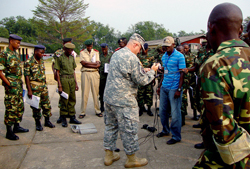Georgia Army National Guard members train Burundi military
By Rich Bartell
U.S. Army Africa

Master Sgt. Derek Gill demonstrates proper use of portable scales with the assistance of an interpreter. Gill and fellow Georgia Army National Guardsman Staff Sgt. Samuel Perez trained more than 30 Burundi soldiers during a two-week Africa Deployment Assistance Partnership Team training known as ADAPT. (U.S. Army Africa photo by Capt. Brad Copas)
 download hi-res photo
download hi-res photoBUJUMBURA, The Republic of Burundi (10/4/12) - A pair of Georgia Army National Guardsmen from the 110th Combat Sustainment Support Battalion trained more than 30 Burundi Armed Forces personnel during two weeks of instruction on deployment and unit movement planning recently.
Capt. Brad Copas of U.S. Army Africa’s G-4, Multi-National and Interagency branch, supervised the two-member GARNG team during an Africa Deployment Assistance Partnership Team training known as ADAPT.
ADAPT is a U.S. Department of State sponsored program focusing on training African partner nation military personnel to improve host nation involvement in peacekeeping operations, Copas said.
“The ADAPT program gives us an ability to assist and improve our working relationships with our African partner nations. Master Sgt. Derek Gill and Staff Sgt. Samuel Perez were very effective in training Burundi troops,” Copas said.
“This is the second phase of training for the Burundi military and they recently received equipment that improved their ability to move cargo and other military specific freight,” Copas said. He said the course was modified to meet training goals.
Copas is a native of Tompkinsville, Ky., and a Kentucky Army National Guard officer on active duty with USARAF.
With French the official language of Burundi, interpreters were instrumental in translating the training for the Burundi students.
“Our course materials are in English so translation to French was imperative. Luckily, we had two students in the course who had studied in the U.S. Again, it was a good learning situation for all of us. The student interpreters were augmented with a contracted interpreter, so we had a total of three. Additionally, the two weeks working as translators helped them improve and build on their English language skills as well. All in all, it was a win-win situation,” Copas said.
Copas said the training covered several areas of unit deployment to include: airlift movement and load planning; equipment preparation, weighing and marking and palletization.
As a member of the African Union, the Republic of Burundi has an active role in a regional peacekeeping mission in Somalia. Course material covered by the ADAPT team during its training will help improve Burundi deployment efficiency for an upcoming African Union Mission in Somalia known as AMISOM.
AMISOM is an active, regional peacekeeping mission operated by the African Union with the approval of the United Nations in Somalia. AMISOM supports the transitional government and assists the implementation of a national security plan. Additionally, AMISOM participants train the Somali security forces and assist in creating a secure environment for the delivery of humanitarian aid.
The Republic of Burundi is a landlocked country in the Great Lakes region of Eastern Africa bordered by Rwanda, Tanzania and the Democratic Republic of the Congo. It’s a relatively small country in comparison to other African countries at 10,745 square miles and a population of about 8.8 million people.
Several African partner nations have requested similar ADAPT deployment training. Georgia Army National Guardsman Gill believes the training can be delivered more efficiently in a centralized location.
“I think we can increase and improve training efficiency by having multiple African partner nation military members in on training location,” Gill said.
Copas said more training will occur in Burundi.
“ADAPT has been beneficial to all participants to date. However, we look forward to working with Burundi again this year to assist them in standing up their own deployment training course,” Copas said.
